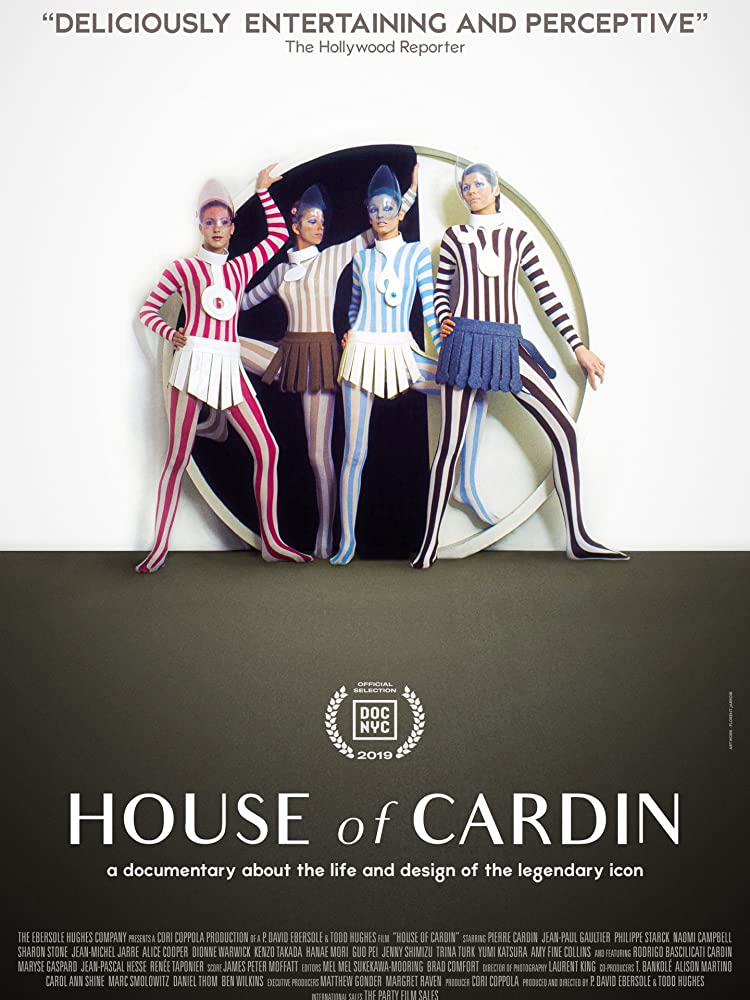a fascinating tribute to Pierre Cardin, fashion visionary, whose work is ‘never done’
G, 97 minutes
Palace Electric
4 Stars
Review by © Jane Freebury
How famous people start out in life is fascinating, all the more for the fact that it can offer few clues about what they become later in life.
Pierre Cardin, a legend of French fashion and an international celebrity who has really earned his fame, is still working at 98 years of age. He is one such person, and the subject of this documentary.
There are some 800 products and businesses that carry the Cardin brand, from men’s and women’s fashions and accessories to pens, cars and furniture, to hotels and restaurants. You need only glance at eBay to confirm that the Cardin name is still everywhere.
an extrovert in his career, reclusive in his private life
He was the youngest of nine children born to a wealthy Italian wine merchant. As a child he apparently liked to create costumes for dolls. I get that, but where did the vision come from?
We will never quite know. This internationally celebrated fashion and lifestyle designer presents the riddle of an extrovert in his working career and a recluse in private life.
Naturally, the first question the film poses is ‘who is Cardin’? A subversive, a socialist, a futurist…always ahead of his time. There are a few, scintillating details like his long affair with French cinema actor Jeanne Moreau and his friendships with other creatives like Jean Cocteau, Pier Paolo Pasolini and Marlene Dietrich.
The place to look for answers is, however, his work. He explains his appetite for his chosen vocation like this, ‘whatever I start, I have to finish’.
Some of the relatives and associates interviewed here call him an enigma, others refer to a very secretive side, and a penchant for referring to himself in the third person.
He has not and never will write an autobiography, but Cardin has authorised this documentary feature of his enthralling life and career. It is directed by gay partners in life and work, P David Ebersole and Todd Hughes.
The first two years of Cardin’s life were spent on a rural property near Venice, before the family moved to France to escape the rise of fascism. His father hoped that his youngest son would work in the family business, or train to become an architect.
 Cardin became apprenticed to a tailor instead, then found employment in the houses of Schiaparelli and Dior in Paris before he launched his own fashion house in 1950. It’s like he never looked back.
Cardin became apprenticed to a tailor instead, then found employment in the houses of Schiaparelli and Dior in Paris before he launched his own fashion house in 1950. It’s like he never looked back.
His career presents a string of bold experiments from his ‘bubble dress’ in 1954, to dashing little numbers with bold geometric shapes and mouldings that freed women up during the 1960s, to the fashion parade on the Great Wall of China in 2018, and more.
He always thought big, really big. His achievements are hard to credit to a single person, long lived as Cardin is.
Early on he was denounced as a fashion socialist, but it is his democratisation of fashion, making his designs accessible to everyone everywhere, that speaks to the world we live in today.
He introduced his work to India, Russia, and China and the Philippines, and was the first couturier to employ a Japanese model.
his fashions, freed of bespoke tailoring constrictions, offered women freedom of movement
The burgeoning Cardin archive could have sunk any filmmaker. Ebersole and Hughes have handled it adeptly, though at a rather fast clip.
A few more dissenting voices from the cut-throat world of haute couture, however, would have counteracted a tendency to hagiography, when the fashion icon hardly needs it, with such an outstanding record.
Before watching House of Cardin, I would have offered the view that his women’s fashion ideas, with their geometric shapes and mouldings, made few concessions to the female figure. But I discover that it is exactly the point. His fashions, freed of bespoke tailoring constrictions, offered women freedom of movement.
Cardin was the first couturier to offer pret-a-porter fashion for men, who he put on the catwalk for the first time. He was himself once a male model.
An early adopter of just about everything, Cardin’s drive has had a visionary bent, perhaps explained by snippets like this, ‘I am very happy with my present, but I am never done’.
An internationalist, an innovator and a futurist, there is much more to the man than clothes. House of Cardin is an unexpectedly fascinating record, well worth a look.
First published in the Canberra Times on 25 July 2020
